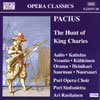Pacius (The) Hunt of King Charles
A welcome issue of a seminal work in Finnish music
View record and artist detailsRecord and Artist Details
Composer or Director: Fredrik Pacius
Genre:
Opera
Label: Marco Polo
Magazine Review Date: 3/2007
Media Format: CD or Download
Media Runtime: 129
Mastering:
Stereo
DDD
Catalogue Number: 8 225317/8

Tracks:
| Composition | Artist Credit |
|---|---|
| (The) Hunt of King Charles |
Fredrik Pacius, Composer
Ari Rasilainen, Conductor Fredrik Pacius, Composer Heikki Nuorsaari, Oxenstjerna, Tenor Heikki Orama, Reutercrantz, Bass Janne Sundqvist, Lewenhaupt, Bass Jukka Saarman, Wachtmeister, Baritone Kai Pitkänen, Jonathan, Tenor Kristiina Kattelus, Eleonora, Mezzo soprano Matti Heinikari, Banér, Tenor Mauri Vesanto, Horn, Bass Niina Ahola, Leonora, Soprano Pekka Kähkönen, Gyllenstjerna, Baritone Pori Opera Choir Pori Sinfonietta Tero Aalto, King Charles XI, Speaker |
Author: Guy Rickards
The Hunt of King Charles (“Kung Karls jakt”) is Finland's first opera - or, at least, the first to be written there (in 1852) - ironically since its composer was German and the libretto is in Swedish, although it is often performed nowadays (as here) in a Finnish translation. The action takes place in the Aland Islands rather than on the Finnish mainland and concerns an abortive attempt in 1671 to overthrow the 16-year-old Swedish king, Charles XI. The story charts the hatching of the conspiracy during Act 1 by a group of Swedish nobles but interrupted by the accidental killing of a royal elk by a seal hunter, Jonathan, and his tracking down (in Act 2). However, his fiancée, Leonora, overhears the nobles' resumed plotting and raises the populace to thwart their coup. As reward, she begs for and is granted Jonathan's pardon, the king's largesse extending to a10-year tax exemption for the islanders fortheir assistance in his release.
Admittedly, Pacius (1809-91) did much to enrich Finland's musical life, not least in his settings of Finnish poetry, including Runeberg's Suomen laulu, which later became the national anthem. Musically, however, The Hunt of King Charles, recently revived by Finnish National Opera, is a German opera and owes far more to Der Freischütz than the Kalevala. It is as much Singspiel as through-composed opera, with a deal of spoken dialogue to move the story along: indeed, the boy king's role is entirely spoken. These passages are no more distracting than in The Magic Flute but the lack of libretto for non-Finnish speakers is a distinct drawback.
There is little overtly nationalistic in Pacius's music, although he injects some local colour into Act 3. There are good moments aplenty and some charming melodies, the pick being Leonora's ballad (disc 1 tr 15) and aria (disc 2 tr 2). Pori Opera's rendition (recorded in 2001) is well drilled, the large cast - there are 21 separate roles - acquitting themselves well, though the huntsmen in the opening chorus sound more like Berliozan brigands than a royal Nordic hunting party! The orchestra support ably without being sensational, directed surely by Ari Rasilainen. The sound is very acceptable, well focused and warm.
Admittedly, Pacius (1809-91) did much to enrich Finland's musical life, not least in his settings of Finnish poetry, including Runeberg's Suomen laulu, which later became the national anthem. Musically, however, The Hunt of King Charles, recently revived by Finnish National Opera, is a German opera and owes far more to Der Freischütz than the Kalevala. It is as much Singspiel as through-composed opera, with a deal of spoken dialogue to move the story along: indeed, the boy king's role is entirely spoken. These passages are no more distracting than in The Magic Flute but the lack of libretto for non-Finnish speakers is a distinct drawback.
There is little overtly nationalistic in Pacius's music, although he injects some local colour into Act 3. There are good moments aplenty and some charming melodies, the pick being Leonora's ballad (disc 1 tr 15) and aria (disc 2 tr 2). Pori Opera's rendition (recorded in 2001) is well drilled, the large cast - there are 21 separate roles - acquitting themselves well, though the huntsmen in the opening chorus sound more like Berliozan brigands than a royal Nordic hunting party! The orchestra support ably without being sensational, directed surely by Ari Rasilainen. The sound is very acceptable, well focused and warm.
Discover the world's largest classical music catalogue with Presto Music.

Gramophone Digital Club
- Digital Edition
- Digital Archive
- Reviews Database
- Full website access
From £8.75 / month
Subscribe
Gramophone Full Club
- Print Edition
- Digital Edition
- Digital Archive
- Reviews Database
- Full website access
From £11.00 / month
Subscribe
If you are a library, university or other organisation that would be interested in an institutional subscription to Gramophone please click here for further information.




